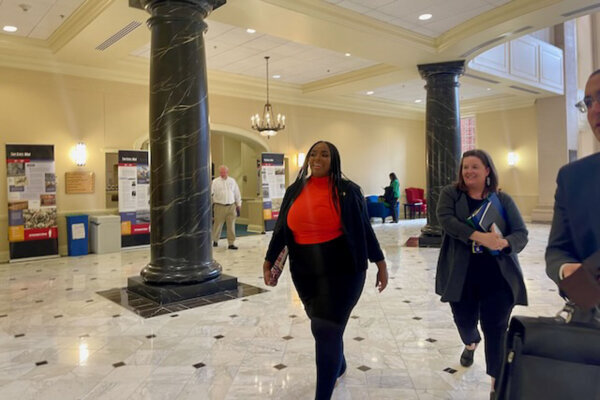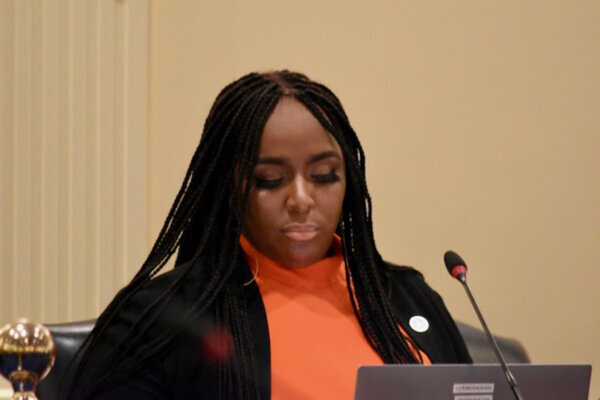This article was republished with permission from WTOP’s news partners at Maryland Matters. Sign up for Maryland Matters’ free email subscription today.
This content was republished with permission from WTOP’s news partners at Maryland Matters. Sign up for Maryland Matters’ free email subscription today.

A muted mid-session reshuffling of two Maryland House of Delegates committees last week raised questions about a potential conflict of interest involving an Anne Arundel County Democrat and her legal work on behalf of a church-affiliated nonprofit that has recently received state funding.
Del. Shaneka Henson (D-Anne Arundel) was moved off the House Appropriations Committee last Friday and replaced with Del. Dana Jones (D-Anne Arundel). Henson was re-assigned to Jones’ seat on the Ways and Means Committee. Both represent District 30A.
The announcement was made on the floor by House Speaker Adrienne Jones (D-Baltimore County) at the same time as the committee assignment for a newly sworn-in delegate. In a subsequent press release announcing the new lawmaker, the Henson and Jones committee flip-flop was omitted.
Henson, a Democratic delegate in her first elected term, was booted from the key committee assignment amid questions about her legal representation of a church-affiliated group on applications for legislative bond funding.

Henson declined to speak to a reporter or offer a written statement about the committee reassignment or the bond funding applications.
A source familiar with the committee swap confirmed that ethical concerns arose from Henson’s relationship to Odenton-based Kingdom Kare, the nonprofit arm for the nondenominational Kingdom Celebration Center. The church’s related nonprofit community outreach programs sought more than $1.5 million in funding through the legislative bond program since 2020.
A spokesperson for the speaker’s office said Jones was unavailable for comment.
Resources for the legislative bond program are limited and requests always outstrip need. By one estimate, annual requests can be 10 times higher than available funding.
Henson was listed as the “legal representative” for the Kingdom Kare on at least two legislative bond requests while she was a legislator. A 2021 ethics disclosure filed with the General Assembly did not list the organization as a source of potential conflict.
Henson had served on the House Appropriations Committee since 2019 when she was appointed to fill the vacancy created by the death of then-House Speaker Michael Busch. Earlier this year, she was appointed to that panel’s Capital Budget Subcommittee, which reviews and makes recommendations on capital bond projects including the so-called legislative bond initiatives.
Kingdom Kare received $200,000 for a project in 2020. Two years later, they were granted another $850,000 for a veteran’s center. The group was seeking another $650,000 this year to complete that project.
Henson is listed as the legal representative on Kingdom Kare’s funding request in 2022. This year, she was again listed as the representative, but this time as Shaneka Johnson.
The delegate practices law in Annapolis and is principal counsel of Johnson Legal Group, where she uses her married name.
She is also a member of Kingdom Celebration Center.
The General Assembly’s part-time structure makes the potential for conflicts of interest — real or just the appearance — an ever-present concern.
Lawmakers are frequently cautioned about potential ethics landmines. A handbook provided to delegates and senators states:
“It is important for legislators to examine their outside interests from the perspective of an average member of the general public to determine if anything presents the appearance of a conflict. Additionally, certain relationships or interests create the legal presumption of a conflict of interest. A legislator with a presumed conflict must either abstain from legislative action relating to the issue or file a disclaimer. If in doubt, a legislator should consult with the Ethics Counsel to determine whether a particular issue should be the subject of a disclaimer or recusal.”
Of particular concern are relationships which are “direct and personal” to the lawmaker or a spouse, dependent child or employer.
“The Ethics Committee has determined that that provision applies to interests that are quite narrowly focused and as to which a clear financial impact would flow from the passage or defeat of the legislation or the success or failure of the matter,” said Deadra Daly, ethics counsel to the General Assembly.
Daly spoke generally about ethics rules that apply to all lawmakers and not specific incidents or legislators.
Some conflicts can be disclaimed after the lawmaker discloses them in public records filed with the legislature. Others involving those direct financial implications may require a lawmaker to recuse themselves.
Not all potential conflicts require lawmakers to recuse themselves from legislative actions. Others involving direct financial implications may require a lawmaker to recuse themselves.
Henson disclosed ownership of her law firm in reports filed with the Maryland State Ethics Commission as well as the 2021 disclosure filed with the General Assembly’s ethics counsel.
The 2021 disclosure related to the general work of her law practice, but did not specifically reference Kingdom Kare and likely would not be considered specific enough to satisfy disclosure requirements for potential financial conflicts.
It is unknown if Henson received any payments from Kingdom Kare for her work as its legal representative. She declined to answer questions regarding payment.
Daly said the disclosures filed by lawmakers can “apply to a specific bill or to all matters that fall within a specifically described subject area.”
Daly used the example of a fictional lawmaker who owns property in western Maryland that could be open to the natural gas extraction process known as fracking.
In that case, a lawmaker seeking to disclaim a conflict related to fracking legislation would not go far enough if they only disclosed a potential conflict regarding a “property in western Maryland.” The lawmaker would have to specifically disclaim the conflict with fracking.
On rare occasions, lawmakers are publicly rebuked for conflicts.
In 2017, the House and Senate voted to reprimand then-Del. Dan Morhaim (D-Baltimore County) for paid consulting work performed for a company seeking a medical cannabis license.
Four years earlier, then-Del. Tony McConkey (R-Anne Arundel) was reprimanded for offering amendments that made changes to a real estate restitution fund. The changes affected seven licensed real estate agents including McConkey.
William F. Zorzi contributed to this report.







